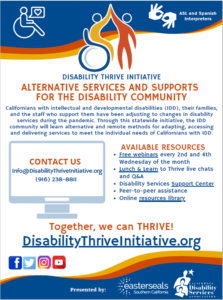NBRC will be closed in observance of Independence Day on Tuesday, July 4th. We will resume business on Wednesday July 5th. Happy freedom day to you and your family!
Juneteenth Closure June 19th
NBRC will be closed on Monday June 19, 2023, as we reflect on an essential part of American history, commemorating African American Freedom. We will resume business on Tuesday June 20, 2023. Happy Juneteenth!
Memorial Day Closure May 29th
In observance of Memorial Day, NBRC will be closed on Monday May 29, 2023. We will resume business on Tuesday May 30, 2023. We wish you a meaningful and memorable Memorial Day!
Self-Determination Program Webinar on March 30th
Are you a client or family member of a client of the regional center? Learn how the Self-Determination Program may empower you on Thursday March 30th at 2pm-3pm! To register please scan the QR Code on the flyer or visit the following link https://bit.ly/SDP3-30


Home & Community Based Services Virtual Training 2/23 & 2/26
The next HCBS and My Rights virtual training will be held on Thursday, February 23rd at 5pm and Sunday February 26th at 2pm via Zoom. This hands-on workshop will educate individuals receiving services on how the HCBS Final Rules might impact day to day lives and offer tools for self-advocacy. Please email project@aloconsultation.com to register.


Home & Community Based Services In-Person Training February 21st
NBRC has partnered with Alo Consultation to offer training and technical assistance around Home and Community Based Services (HCBS) to the community. Learn how HCBS may improve choice, independence, privacy, community integration and more! To register, please email project@aloconsultation.com or just show up!









